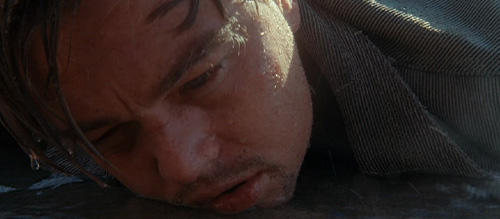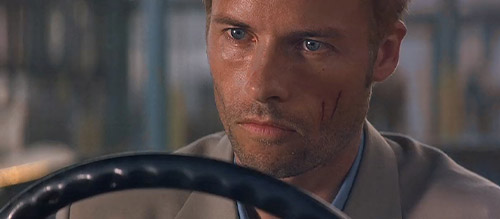Nolan’s Films Are Complex, but Are They Deep?
Way back in 1997, Christopher Nolan released Doodlebug, a short film about a man trying to squash a bug in his cramped apartment. The director’s trademarks were already present; claustrophobia, existential dread, and a surreal twist that suggests a non-linear chronology. There’s little time for the character development or emotional depth one might expect from a feature length movie, and little need for either of them in something so well shot, thematically concise, and lasting only three minutes. But has Nolan moved on since Doodlebug? Are his later efforts really more rich and substantial, or is he merely stretching the same whacky concepts over two and a half hours?
Twenty three years has seen the release of the much-hyped Tenet, a primary criticism of which has been its use of sound. Similar complaints were leveled at Inception (2010), The Dark Knight Rises (2012), and Interstellar (2014), with viewers feeling that actors were mumbling, and important spoken sections were hard to make out above the near-constant soundtrack. Although this may seem like a job for the sound department, Nolan is incredibly involved in his films from conception to release, and has long allowed his sound design to greatly affect the tone and pacing of his movies.
The endless music and marked lack of silence in Nolan’s feature films really afford them some of Doodlebug’s claustrophobia. Tenet’s thumps and booms and screeching synthesisers sync up with every scene, something which is artful and stylish and keeps the blood racing. Like a true action movie, there are few quiet spaces to reflect or to feel. If the music stops, it’s probably because a gunfight has broken out, or a helicopter is deafeningly taking off. The interactions between main characters, even those chillingly toxic ones shared by Andrei (Kenneth Branagh) and his wife Kat (Elizabeth Debicki), are fast and plot-heavy. Some scenes slow a little compared with the rest of the movie, but all the pacing is so elevated above real life that much of one’s viewing is spent trying to keep up.
It’s known that Nolan is a huge Bond fan, and if Tenet, Inception and Memento are merely action thrillers exalted to complex and psychologically challenging levels, must an audience expect slow thoughtful pacing when there are so many twists and turns to get through? The issue is that Nolan boasts more than this; he employs prestigious actors in roles written for them alone, and gives his characters a wealth of emotions and troubled backgrounds that beg a certain degree of exploration.
One scene in Tenet sees The Protagonist (John David Washington) note that Kat is asleep – another director may have allowed for more space between it and the dialogue, but when The Protagonist looks at Kat, her sleeping form is on screen for a fraction of a second before talking resumes. The same can be said for Inception’s maze scene: it’s a potentially engaging passage where Cobb (Leonardo DiCaprio) gives Ariadne (Ellen Page) two minutes to draw a maze that it takes one minute to solve. It’s their first exchange alone, and despite Ariadne making three attempts, the scene is over in about forty-five seconds. Another director may have lingered, may have let the lessons and their insinuations sink in. Not Nolan, who keeps the soundtrack going throughout and segues quickly to another scene before most viewers have a chance to process what has happened.
It’s interesting that most conversations about Inception are little to do with the protagonist’s grief, self-deceit and existential dread. The film’s main pull is certainly its complicated plot, as if mapping out the narrative is a set challenge for viewers. Plot appears to be a priority with Nolan, and every part of the film merely serves it. There are times where character development is breezed past once it has done its duty to the narrative, even if further exploration would have charged the storyline with more emotion and thus an incentive to keep watching. There are, however, a handful of exceptions to this rule…
Interstellar had tear jerking moments, and expansive characters with room to breathe. The opening scenes that follow Cooper (Matthew McConaughey) and his children inhabiting a barren and doomed planet earth are uncharacteristically slow, and later there’s a devastating scene in which he watches video messages from his children, now grown up in his absence due to the relativity of time and space.
Though nonlinear time is a strong subject of Interstellar, its primary theme is love. Interstellar, The Prestige (2006), and Dunkirk (2017), certainly hit home emotionally more than Nolan’s action-packed spectacles. Whether it’s through their slower pacing, period set pieces, or more believable plotlines, these latter two films feel as if they are set on earth, whereas Tenet and Inception almost pride themselves on being a sort of self-contained madness, a nice neat puzzle to solve rather than a sprawling question about humanity.
But perhaps this is not the way we should be approaching Nolan’s works…
Regardless of whether his films make an audience laugh or weep, could it be that the crazy concepts themselves are where the depth lies? Nolan, who studied English Literature, invites audiences to dissect and analyse his themes in a similar way that one is encouraged to read Shakespeare at University. Maybe his intention is not always to get through to his audience immediately, but rather to send chills down their spines over the coming weeks as the implications of his plot begin to unravel themselves in their minds, perhaps with the help of some online explanations.
As stated above, Inception may well be about grief and existential dread. There is something terrifying about the way Cobb may be kidding himself into thinking he is not dreaming, just to spend more time with the love of his life. Tenet similarly explores Andrei’s willingness to turn back time with his wife by his side, despite her clearly loathing him. He would rather live in a fantasy world of his own creation than face his own mortality and shattered relationship. This may have shone through if Branagh’s nuanced performance had been afforded more screen time, but the film had a lot to get through in its 150 minutes.
Christopher Nolan’s first blockbuster Memento features a similar vein of self-deceit. Leonard (Guy Pearce) has no short-term memory, and so the movie runs backwards in time, each scene explaining how the previous one came about. This illness is cleverly exploited not only as a narrative device but by its sufferer himself; he knows that he will forget anything he does not record, and gladly does this in order to give his life purpose. He deceives himself into continuing a fruitless search to avoid confronting a terrible grief. However oddly the director delivers such a theme, it’s far from shallow.
Dunkirk is the intense and claustrophobic war movie that many wanted, but still utilises a non-linear timeline. Events unfold for some characters before others, and whilst adding to the warlike chaos of the movie, this device serves to express the differing experiences of the Dunkirk evacuation from the perspectives of ground troops, the navy, and the air force, all of whom would have remembered the event as taking very different lengths of time. It could be viewed as a gimmick, a Nolan trademark crowbarred into a potentially straightforward drama. It could be viewed as clever, informed, and sensitive. Some of it must come down to personal taste.
Recommended for you: Christopher Nolan Films Ranked
Whatever you think of each movie, they’re certainly momentous tasks to watch, as viewers find themselves juggling the plot, themes, and emotions of individual characters, all while trying to enjoy the picture as a whole. Not surprisingly, it may take a quote from the director himself, responding to complaints of Interstellar’s sound mixing, to shed some light on how his films are intended to be enjoyed:
“I don’t agree with the idea that you can only achieve clarity through dialogue. Clarity of story, clarity of emotions — I try to achieve that in a very layered way using all the different things at my disposal — picture and sound. I’ve always loved films that approach sound in an impressionistic way and that is an unusual approach for a mainstream blockbuster, but I feel it’s the right approach for this experiential film.”
Despite critics’ constant endeavours to get to the bottom of his plotlines, this quote suggests that their efforts may be misguided if they wish to fully understand his films. Perhaps Nolan, under the guise of creating complex plots whose logic needs mapping out, has spent his career doing something wholly illogical: telling tales of pure feeling. Perhaps, much like his hero Stanley Kubrick, he has been using cinema as it ought to be used; as an audio-visual medium for expressing an emotion, an idea. Seeing Tenet in the cinema, as with many of his other films, is an unforgettable experience. One’s senses are bombarded, and one is left with surprisingly few questions after the film’s end. The story makes perfect sense according to its own science-fiction rules; it may be difficult to follow every twist and turn of the plot without a clear mind and a notepad at the ready, but the emotions, the motivations, and the gravity of the situations, shine through without hindrance.
Nolan’s films are more like pieces of music; they are a sensory experience, and the complicated plot is merely Nolan’s idiosyncratic way of writing. The way his soundtracks sync up so perfectly with the action makes the two inseparable, like an opera or musical play. He can’t resist far-out science-fiction concepts, but these do not define his style. It’s common to see those credits roll and feel as if there’s something you’ve missed, but a complicated plot only has so much depth; once it’s solved, it’s solved. What Nolan does is give viewers some meat to chew on, no matter how buried that can seem; some pure essence of raw emotion, something that scares them, something that confuses them, something that shocks them and gets the blood pumping. This often runs the risk of alienating those who want to get stuck in by making them feel like they’ve missed far too much of the storyline to appreciate the spectacle, but Nolan doesn’t really demand you understand everything. He takes you on a wild ride, and whether you like it or not, you’re unlikely to forget it.
Written by Louis B Scheuer
You can support Louis B Scheuer in the following places:
Twitter – @louisbscheuer
Instagram – @louisbscheuer
Recommended for you: Christopher Nolan’s Cinematic Chores – Understanding Tenet





